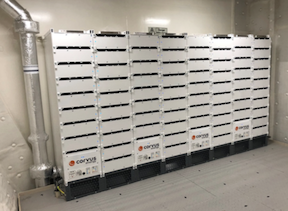The following is text of a news release from BC Ferries:
(VICTORIA, British Columbia) — BC Ferries revealed the names of its first two Island-class ferries at a special naming ceremony Wednesday at Victoria’s Point Hope Maritime. Island Discovery and Island Aurora are the newest vessels to enter the fleet and will enter service in mid-2020, serving the Powell River-Texada Island and Port McNeill-Alert Bay-Sointula routes, respectively.
The names were selected with community input and celebrate the beauty of the journey and the important connection to the coastal communities the ferries will soon serve. The ceremony began with a few words from BC Ferries and Damen Shipyards, followed by the unveiling of the ships’ names, and the christening of the hulls.
In keeping with maritime tradition, BC Ferries selected sponsors for each of the ships. These roles are important – each sponsor bestows the ship with good luck and protection for all those who travel on them. Each ship has a community sponsor and a sponsor from the BC Ferries family. In recognition of her achievement and long service with BC Ferries, Senior Business Analyst Sandy Leduc christened Island Discovery along with former Northern Sunshine Coast Ferry Advisory Committee member Sandy McCormick from Texada Island. To christen Island Aurora, Alert Bay resident and chairwoman of the Tri-Island Ferry Advisory Committee, Melissa Fletcher, joined North Island Catering Superintendent Sheila O’Neill, a longtime member of the BC Ferries family.
The first of the new vessels, Island Discovery, will be deployed on the Powell River-Texada Island route, replacing the 59-year-old North Island Princess, which will be retired from the BC Ferries fleet. The second vessel, Island Aurora, will replace Quadra Queen II on the Port McNeill-Alert Bay-Sointula route. Quadra Queen II will become a relief vessel.
Island-class ferries have the capacity to carry 47 vehicles and between 300 and 450 passengers and crew, depending on configuration. They are battery-equipped ships designed for future full electric operation. The ships are fitted with hybrid technology that bridges the gap until shore charging infrastructure and funding becomes available in B.C. From the exterior details to the engines, the design of the new vessels reduces underwater radiated noise, lowers emissions and improves customer service. Partial funding for these two vessels was provided by the federal government through the Provincial-Territorial Infrastructure Component-National and Regional Projects.

